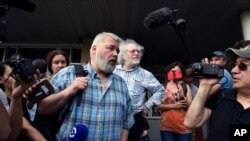U.S. lawmakers warned this week that Russian President Vladimir Putin is seeking to eliminate a free press to prevent Russian media from reporting on the war in Ukraine.
Since invading Ukraine in February, Moscow has blocked access to news websites inside Russia, forced independent media to close and passed a new law threatening up to 15 years in prison for “false” reporting on the conflict. Already, at least three bloggers have been accused of spreading “false news” about the military, the state-run RIA news agency reported.
In a statement on Tuesday, senators Bob Menendez and Jim Risch, chair and ranking member of the Senate Foreign Relations Committee, condemned Russia’s actions against the media.
“Putin has brazenly focused on eliminating any last shred of free press and freedom of expression inside Russia,” read the statement.
Russia has blocked outlets including the radio station Ekho Moskvy and Dozhd TV “in a desperate effort to undermine objectivity and keep the truth about his illegal and unjustified war from the Russian people,” the statement added.
Putin said in a speech Wednesday that “an unprecedented information campaign has been unleashed” involving social networks and Western media.
He added that the West would try to use “traitors” as a fifth column to destroy Russia.
"The collective West is trying to divide our society, speculating on military losses, on the socioeconomic consequences of sanctions, to provoke a civil confrontation in Russia,” he said.
Alexei Venediktov, the editor-in-chief who led Ekho Moskvy for 24 years, believes authorities deliberately closed his news and talk show alongside some other media to prevent discussion on the war.
“Total propaganda was being prepared in the country,” Venediktov said. “It was necessary (for them) to demolish traditional and established media that are respected.”
Ekho Moskvy was “listened to by people, decision-makers,” Venediktov said. “We introduced doubts, showing that there is no single point of view, there is no single correct answer to what is happening. Therefore, it was decided to demolish (us) quickly, immediately, ignoring all existing rules and laws. Just slap — and slap,” he said.
The frequency that Ekho Moskvy used for its broadcasts has already been taken over by Sputnik, the state-run radio station. The U.S. State Department in January said Sputnik was a critical part of Russia’s “disinformation and propaganda ecosystem.”
But even at state-controlled media, some journalists are pushing back.
On Monday, an employee at state-run Channel One interrupted a live broadcast to protest the invasion. Marina Ovsyannikova was detained, questioned for 14 hours and released with a fine.
The BBC reported that at least three journalists at Russian state-run outlets have resigned since the invasion.
For some independent media, journalists are walking a fine line to stay in business.
The Novaya Gazeta, run by 2021 Nobel Peace Prize laureate Dmitry Muratov, has said it would continue publishing, but made it clear that the media regulator and new law are preventing it from reporting on some issues.
The newspaper, which is known for its investigative reporting, said Wednesday that news kiosks have started to return copies of its editions. But it said no official order appears to have been passed down to the kiosk distributors telling them to send back copies. Novaya Gazeta has said readers can come to its offices in Moscow to buy a copy of the paper.
“The field has been practically cleared, the sweep continues, and prestigious media are being closed,” Venediktov said. “But the truth begins to seep through anyway.”
For instance, details still emerged of how an alleged order from Putin to not send conscripts to Ukraine was ignored. In that case, it was thanks to reporting by the Latvia-based Russian website Meduza.
Venediktov said that a member of Russia’s Security Council told him that if Ekho Moskvy had still been reporting, the Security Council would have known about it earlier.
Venediktov replied, “You killed us. You shut us down. Now, you don’t know what’s going on there, how your orders are being carried out?”
‘Simple choice’
With its website blocked and the new media law enacted, the independent Dozhd TV was “faced with a simple choice,” said editor-in-chief Tikhon Dzyadko.
Either the outlet’s journalists become nothing more than a service to repeat the Ministry of Defense, Dzyadko said, “or we continue to work as we have for these 12 years, and soon become defendants under this new so-called law on ‘fake news’ on the military.”
Access to Dozhd was blocked on March 1, the same day as Ekho Moskvy.
“After that, we received information that the police were to come and search us,” Dzyadko said. “We understood that the situation was deteriorating — deteriorating very quickly, deteriorating critically.”
Dzyadko left Moscow for Tbilisi in Georgia a few days later, saying on Telegram that staff members were receiving threats.
The reason Dozhd was targeted “is very simple,” Dzyadko said.
“There are two wars waged by the Russian Federation: One is the war in Ukraine, the second is the war within Russia,” he said. The purpose: “to hide the truth.”
‘One step ahead’
Dzyadko believes Russia has been partly successful in censoring the media, but he said the digital age makes censorship difficult.
“Technology is always one step ahead of the repressive actions of the state, and there will always be ways to deliver information,” he said.
And as the death toll of Russian soldiers increase, families will start to ask questions, he said.
Attempts to block news websites, including VOA’s Russian language website, have resulted in an increase in the use of circumvention tools such as VPNs.
Between February 24 and March 5, downloads for the “top 10 VPNs in Russia surged by 4.3% from an average of 16,000 per day to more than 700,000 daily,” the website Appfigures reported.
VOA and other major international broadcasters, including Deutsche Welle, are working closely with companies providing software that allows users in Russia to reach websites blocked by the government.
Dzyadko said it is too early to say whether Dozhd will resume broadcasting.
“We have a huge audience base that has supported us all these years … we feel responsible to them,” he said. “Therefore, undoubtedly, we will do something somewhere.”
This article originated in VOA’s Russian Service.









